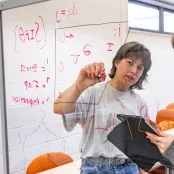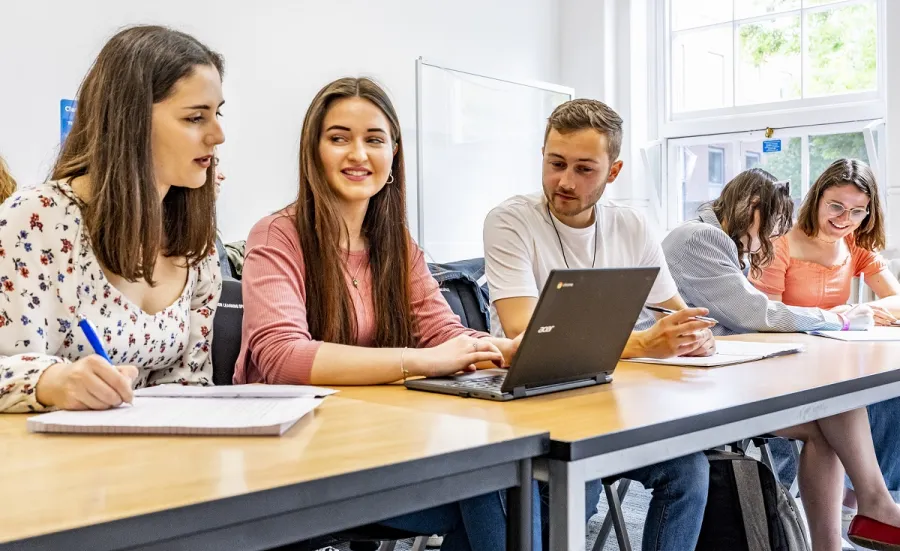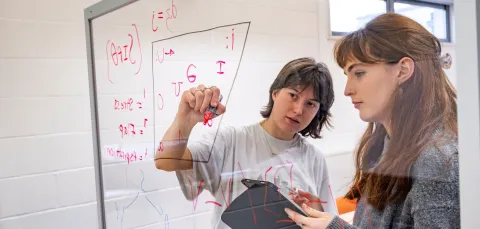About this course
Discover how English has developed through history and how it varies in different societies. You'll explore the language, its structure and the linguistic science behind it. You can also choose from a wide range of modules that follow your interests and career goals in the subject. We have one of the UK’s leading Languages, Cultures & Linguistics department.
This English language and linguistics degree will give you an advanced knowledge of contemporary English, its development, systems and use around the world. You'll learn analytical, research and personal skills relevant to a range of careers.
You’ll explore topics like:
- sociolinguistics
- language change
- language acquisition
- psycholinguistics
- English language teaching
- world Englishes
You can also study a foreign language and take modules in related disciplines, such as sociology, psychology and English literature.
In your final year, you’ll write a dissertation specialising in an area that interests you, based on your studies in years 1 and 2. This will use the skills you developed over the rest of the course.
This course will give you the training and expertise that are of special interest to many employers. It provides the knowledge and skills to follow a wide range of careers.
You will also have access to our Digital Humanities Hub and support from our team of expert academics and technicians.
Through the hub, you can investigate how technology can enhance the study of languages, cultures and linguistics. This includes:
- creating immersive virtual experiences of intercultural and multilingual environments
- using specialist software to analyse speech sounds or large-scale text data
- explore the differences between human and machine translation
This course is available as a 4-year variant with a year abroad in countries such as America, Canada, South Korea, Germany and more. This is a good opportunity to spend a year studying at a partner university.
We regularly review our courses to ensure and improve quality. This course may be revised as a result of this. Any revision will be balanced against the requirement that the student should receive the educational service expected. Find out why, when, and how we might make changes.
Our courses are regulated in England by the Office for Students (OfS).

Our lectures and seminars were highly collaborative and individualised, enabling open discussions to fuel learning. They also helped us build strong relationships with each of our lecturers.

I’ve had two Linguist roles now where what I learnt in my degree was essential and used every day. The nature of the course’s flexibility also gave me breadth as well as in-depth knowledge on my areas of interest which were particularly useful.

I was fortunate enough to be taught by the most incredible linguistics department, whose passion for their research really inspired and motivated me to pursue my interests and work my hardest.
Course location
This course is based at Avenue.
Awarding body
This qualification is awarded by the University of Southampton.
Download the Course Description Document
The Course Description Document details your course overview, your course structure and how your course is taught and assessed.
Entry requirements
For Academic year 202627
A-levels
ABB
A-levels additional information
Offers typically exclude General Studies and Critical Thinking.
A-levels with Extended Project Qualification
If you are taking an EPQ in addition to 3 A levels, you will receive the following offer in addition to the standard A level offer: BBB and grade A in the EPQ
A-levels contextual offer
We are committed to ensuring that all applicants with the potential to succeed, regardless of their background, are encouraged to apply to study with us. The additional information gained through contextual data allows us to recognise an applicant's potential to succeed in the context of their background and experience. Applicants who are highlighted in this way will be made an offer which is: BBC from 3 A levels.
International Baccalaureate Diploma
Pass, with 32 points overall with 16 points at Higher Level.
International Baccalaureate Diploma additional information
Offers typically exclude General Studies and Critical Thinking.
International Baccalaureate contextual offer
We are committed to ensuring that all learners with the potential to succeed, regardless of their background, are encouraged to apply to study with us. The additional information gained through contextual data allows us to recognise a learner’s potential to succeed in the context of their background and experience. Applicants who are highlighted in this way will be made an offer which is lower than the typical offer for that programme.
International Baccalaureate Career Programme (IBCP) statement
Offers will be made on the individual Diploma Course subject(s) and the career-related study qualification. The CP core will not form part of the offer. Where there is a subject pre-requisite(s), applicants will be required to study the subject(s) at Higher Level in the Diploma course subject and/or take a specified unit in the career-related study qualification. Applicants may also be asked to achieve a specific grade in those elements. Please see the University of Southampton International Baccalaureate Career-Related Programme (IBCP) Statement for further information. Applicants are advised to contact their Faculty Admissions Office for more information.
BTEC
RQF BTEC
Distinction, Distinction, Merit in the BTEC National Extended Diploma.
Distinction, Distinction in the BTEC National Diploma plus B in an A level.
Distinction in the BTEC National Extended Certificate plus AB at A level
We are committed to ensuring that all learners with the potential to succeed, regardless of their background, are encouraged to apply to study with us. The additional information gained through contextual data allows us to recognise a learner’s potential to succeed in the context of their background and experience. Applicants who are highlighted in this way will be made an offer which is lower than the typical offer for that programme.
QCF BTEC
Distinction, Distinction, Merit in the BTEC Extended Diploma.
Distinction, Distinction in the BTEC Diploma plus B in an A level.
Distinction in the BTEC Subsidiary Diploma plus AB at A level
BTEC contextual
We are committed to ensuring that all learners with the potential to succeed, regardless of their background, are encouraged to apply to study with us. The additional information gained through contextual data allows us to recognise a learner’s potential to succeed in the context of their background and experience. Applicants who are highlighted in this way will be made an offer which is lower than the typical offer for that programme.
Access to HE Diploma
60 credits with a minimum of 45 credits at Level 3, of which 30 must be at Distinction and 15 credits at Merit.
Access to HE additional information
Offers typically exclude General Studies and Critical Thinking.
Access Offer Contextual
We are committed to ensuring that all learners with the potential to succeed, regardless of their background, are encouraged to apply to study with us. The additional information gained through contextual data allows us to recognise a learner’s potential to succeed in the context of their background and experience. Applicants who are highlighted in this way will be made an offer which is lower than the typical offer for that programme.
Irish Leaving Certificate
Irish Leaving Certificate (first awarded 2017)
H1 H2 H2 H2 H3 H3
Irish certificate additional information
Offers typically exclude General Studies and Critical Thinking.
Irish Offer Contextual
We are committed to ensuring that all learners with the potential to succeed, regardless of their background, are encouraged to apply to study with us. The additional information gained through contextual data allows us to recognise a learner’s potential to succeed in the context of their background and experience. Applicants who are highlighted in this way will be made an offer which is lower than the typical offer for that programme.
Scottish Qualification
Offers will be based on exams being taken at the end of S6. Subjects taken and qualifications achieved in S5 will be reviewed. Careful consideration will be given to an individual’s academic achievement, taking in to account the context and circumstances of their pre-university education.
Please see the University of Southampton’s Curriculum for Excellence Scotland Statement (PDF) for further information. Applicants are advised to contact their Faculty Admissions Office for more information.
Cambridge Pre-U
D3 M2 M2 in three principal subjects
Cambridge Pre-U additional information
Offers typically exclude General Studies and Critical Thinking.
Cambridge Pre-U Offer Contextual
We are committed to ensuring that all learners with the potential to succeed, regardless of their background, are encouraged to apply to study with us. The additional information gained through contextual data allows us to recognise a learner’s potential to succeed in the context of their background and experience. Applicants who are highlighted in this way will be made an offer which is lower than the typical offer for that programme.
Welsh Baccalaureate
ABB from 3 A levels or AB from two A levels and B from the Advanced Skills Baccalaureate Wales
Welsh Baccalaureate additional information
Offers typically exclude General Studies and Critical Thinking.
Welsh Baccalaureate contextual offer
We are committed to ensuring that all learners with the potential to succeed, regardless of their background, are encouraged to apply to study with us. The additional information gained through contextual data allows us to recognise a learner’s potential to succeed in the context of their background and experience. Applicants who are highlighted in this way will be made an offer which is lower than the typical offer for that programme.
T-Level
The following T levels are accepted: Education and Early Years; Media, Broadcast and Production; Legal Services; Marketing
Other requirements
GCSE requirements
Applicants must hold GCSE English language (or GCSE English) (minimum grade 4/C) and mathematics (minimum grade 4/C)
Find the equivalent international qualifications for our entry requirements.
English language requirements
If English is not your first language, you must show that you can use English to the level we require. Visit our English language pages to find out which qualifications we accept and how you can meet our requirements.
If you are taking the International English Language Testing System (IELTS), you must get at least the following scores:
IELTS score requirements
- overall score
- 6.5
- reading
- 6.0
- writing
- 6.0
- speaking
- 6.0
- listening
- 6.0
If you do not meet the English language requirements through a test or qualification, you may be able to meet them by completing one of our pre-sessional English programmes before your course starts.
You might meet our criteria in other ways if you do not have the qualifications we need. Find out more about:
- skills you might have gained through work or other life experiences (otherwise known as recognition of prior learning)
Find out more about our Admissions Policy.
Foundation programmes for international students
A foundation programme will give you the language skills and subject knowledge you need if you're not qualified for direct entry to your chosen undergraduate course.
You'll progress to your chosen course after successfully completing the foundation programme.
Find out more about undergraduate foundation programmes for international students.
Mature applicants
We welcome applications from learners of all ages. Students who are aged 21 and over at the start of their undergraduate course are defined as mature by the University of Southampton. We take a holistic assessment of the application looking for academic ability and commitment to study. Typical entry requirements, which may vary from discipline to discipline, includes for example, evidence of recent formal academic qualifications or professional qualifications, relevant work experience or volunteering. You may also be invited to attend an interview with an Admissions Tutor. For some degree programmes, there may also be a Professional, Statutory and Regulatory Body (PSRB) requirement. We accept many different academic qualifications. For more information, please contact the Admissions Team.
Got a question?
Please contact our enquiries team if you're not sure that you have the right experience or qualifications to get onto this course.
Email: enquiries@southampton.ac.uk
Tel: +44(0)23 8059 5000
Course structure
The course combines compulsory and optional modules. This lets you tailor your learning to suit your interests and ambitions, with the level of choice increasing across the three years of study.
You can combine modules from the Modern Languages & Linguistics department with modules from other disciplines. This results in many unique versions of the degree.
Year 1 overview
You’ll develop your English language analytical skills and see how history and society have changed it. You’ll learn the linguistic tools and study sound, structure and meaning.
You will take modules in:
- the history of the English language
- attitudes and ideologies around English
- global Englishes
- phonetics and phonology
- morpho-syntax, semantics and pragmatics
- language acquisition
You'll choose optional modules on both language and linguistics such as:
- understanding culture
- understanding history and society
Year 2 overview
You’ll explore how English is used, how it works and how it’s spoken in different cultures. You'll focus on language variation and change, acoustic phonetics and syntax.
Options include subjects such as:
- psycholinguistics
- gender and society
- corpus linguistics
- discourse analysis
- multilingualism
- language and power
From year 2, students can also choose to either take up a new language or continue a language they previously studied at GSCE or A level.
Finally, year 2 offers students the opportunity to take modules in Digital Humanities including:
- data environmentalism
- data, cultures and justice
- queering the digital
Year 3 overview
You’ll write a dissertation on a topic that interests you.
You can also choose modules such as:
- sociophonetics
- advanced sociolinguistic theory
- language and speech disorders
- second language acquisition
- language in urban centres
- rethinking autism
- advanced global Englishes
- language testing and assessment
Want more detail? See all the modules in the course.
Modules
The modules outlined provide examples of what you can expect to learn on this degree course based on recent academic teaching. As a research-led University, we undertake a continuous review of our course to ensure quality enhancement and to manage our resources. The precise modules available to you in future years may vary depending on staff availability and research interests, new topics of study, timetabling and student demand. Find out why, when and how we might make changes.
For entry in academic year 2026 to 2027
Year 1 modules
You must study the following modules in year 1:
Academic Skills for Modern languages and Linguistics students
This module is designed to ease the transition from A-level to the first year of a single or combined honours degree programme by setting out clearly what we expect of you at undergraduate level and equipping you with the resources to be able to operate a...
Applications of Linguistics
This unit will introduce you to the main areas relevant to applied language studies.
Elements of Linguistics - Sound, Structure and Meaning
This module provides an introduction to linguistic approaches to sound, structure and meaning in the branches of linguistics known as phonetics and phonology, morphology, syntax, semantics and pragmatics.
From English to Englishes
This module introduces you to the spread of English from its historical origins to colonial and postcolonial contexts and, further, to current global contexts. It explores sociolinguistic issues and debates centering on the development of English. It enga...
Language Acquisition
You may have asked yourself how children learn their first language or whether some animals can speak just like humans do. People often wonder whether there are any lifelong benefits of bilingualism as well. This module introduces you to the field of lang...
Language, Ideologies and Attitudes
This module explores language in its social context. The main aim of this module is to introduce you to key research approaches to the study of language attitudes and ideologies and to encourage you to reflect on how attitudes and beliefs about language e...
Structure of English
If English is your native language, or even if you learned it as an additional language, you may not be aware of the structure of its sounds, words, phrases and sentences. In this module you will learn to describe how English sentences are constructed and...
The Making of Modern English
The module looks at the development of the English language, and examines its relationship with other, potentially rival, languages that have been spoken in the British Isles. It examines the effect of successive waves of conquest on the sociolinguistic s...
You must also choose from the following modules in year 1:
Applied Ethics
In both public and private life, we face difficult and pressing ethical questions every day. Should we give a proportion of our wealth to those in developing countries? Should we allow doctors to perform abortions or euthanasia and, if so, under what circ...
Literary Transformations
Why have some stories gripped the imagination of writers, musicians, and artists across cultures and centuries? And what does the emergence and constant re-emergence of such stories tell us about ourselves and others, past and present? What do readers and...
Puzzles about Art and Literature
Both individuals and society attach great importance and value to certain works of art, including poems, novels, films, plays, symphonies, and paintings. Most of us spend a considerable amount of our limited time and resources acquiring, creating, experie...
Understanding History and Society
This module will introduce you to studying questions of history, society and culture through the prism of Southampton in order that you can apply those approaches to the study of cities in the French, Spanish and German-speaking world.
World Dramas
In this module, you will learn how to approach dramatic texts in a way that takes into consideration their place in the world as a complex political, economic, and cultural network. We will focus on questions such as: • What is the difference between r...
Year 2 modules
You must study the following modules in year 2:
Sound and Voice
This module builds on the basic concepts of articulatory phonetics introduced in the first year, and introduces theory and methodology of acoustic science for the study of the production and perception of speech sounds.
Syntax: Studying Language Structure
This module will provide introduce you to the study of syntax within current linguistic theory.
Variation and Change in English
This module takes an empirical approach to questions such as: - Are there patterns of speech and language associated with males and females in varieties of English? - What is the role of teenagers in the propagation of change in English? - After a...
You must also choose from the following modules in year 2:
Corpus Linguistics: Working with large-scale text data
In this module, we introduce corpus linguistics as an approach to and method for analysing large-scale text data. We will develop an understanding of building and curating datasets, annotating data, and using quantitative and statistical measures for text...
Desire and Decay: Literature of the Long Eighteenth and Nineteenth centuries
From the aftermath of the English Civil War in the seventeenth century to the cultural legacies of the nineteenth century, the literature of the long eighteenth and nineteenth centuries is marked by intense negotiations between desire and decay. The drive...
Discourse Analysis
This module highlights and analyses the link between language structure and its situation of occurrence.
English on the Move
English has always been on the move. As a literary language, it has not only travelled from and back to England; lines of influence between texts, authors, publishers, editors, book technologies, and readers traverse the globe in multiple directions, bet...
Experiment!
What does it mean to make literature new? What forms and reformations have offered starting points for rethinking literary convention? In this module, you will explore the revolutions, innovations, and boundary-crossings that have taken place in literatur...
Globalisation: Culture, Language and The Nation State
This module will problematize the concept of globalisation and explore and develop an understanding of its meaning in economic, political and cultural terms. Furthermore, we will examine the ideological struggle between competing forces over the nature an...
How the Arts Work: A Practical Introduction to Cultural Economics
How are the arts getting back to work again after Covid-19? This is a critically important question for everyone who cares about them, artists and audiences alike. If you’re a student considering a career in the arts you’ll want to know where fresh opport...
Intercultural Communication in a Global World
In a world of fast and easy communication, we are increasingly working and studying alongside people from different cultural and linguistic backgrounds. Understanding our intercultural encounters allows us to develop awareness of ourselves and others, as ...
Language, Power and Institutions: how linguistic practices can shape our lives
This module will introduce you to the making of institutions through language. We will investigate the links between language, institutions, and power to understand, how institutions are not only shaping the language used by members and users of instituti...
Learning about Culture: Introduction to Ethnography
Multilingualism
This module will introduce you to the notion of ‘Multilingualism’, how this is understood and represented in different ways, and why it matters to you. You will explore how people become multilingual, and whether it makes a difference if multilinguals are...
Psycholinguistics
This module examines different sub-topics in psycholinguistics which help to understand what the relationship between language and the human mind might be.
Researching Language, Culture and Communication in the Global World
This module will introduce you to solving real world problems in the area of Language, Culture and Communication with research methods including forms of discourse analysis, questionnaires, interviews and narrative inquiry. You will reflect on some key ...
Speech Acts
How do writers activate and amplify the sonic properties of language? Why do artists use vocal performance of text in video art? How can text ‘perform’ on the page (or onscreen), and what does it mean for language to be performative? What does writing for...
Teaching English as a Foreign Language
This module will introduce you to key issues, concepts and methods in teaching English as a second/foreign language.
The EU and European Identity
The course seeks to provide an overview of the evolution of the European Union (EU) from its early stages to the present. In so doing, it examines the ideas and history of the EU, the institutions of the EU, examples of specific issue areas and the presen...
The Worlding of English Literature
Since the mid-nineteenth century, new modes of transport and communication, commerce and violence, have remade the world. As empires expanded and contracted, and as the relationships between states and individuals were repeatedly reconfigured and tested, ...
Year 3 modules
You must study the following module in year 3:
You must also choose from the following modules in year 3:
English as a Global Language
This module explores the rise of English as a global language focusing on the factors that have led to, and the issues that have arisen from, its dominant status. You will learn about the interrelation between globalisation, standardisation and variabilit...
Corpus Linguistics: Working with large-scale text data
In this module, we introduce corpus linguistics as an approach to and method for analysing large-scale text data. We will develop an understanding of building and curating datasets, annotating data, and using quantitative and statistical measures for text...
Creative Writing in Schools
Are you interested in helping young people study English? This module will introduce you to teaching creative writing in secondary schools by providing training in effective classroom management and guidance on designing lesson plans for studying fiction ...
Digital Media, Language and Communication
This module will deepen your theoretical and practical insights into communication through digital media, as well as how these media influence language use. You will gain an understanding of how technological developments since the late-twentieth century ...
Health, Culture, and Discrimination
Deadly illnesses have frequently been invested with a great deal of symbolic and cultural significance. This interdisciplinary module will introduce you to how various diseases and conditions (AIDS, cancers, obesity, Covid-19, and mental health issues and...
How the Arts Work: A Practical Introduction to Cultural Economics
How are the arts getting back to work again after Covid-19? This is a critically important question for everyone who cares about them, artists and audiences alike. If you’re a student considering a career in the arts you’ll want to know where fresh opport...
Language Testing and Assessment in Society
This module develops awareness of how language testing and assessment have developed in educational and wider social contexts. It focusses on both purposes and processes of language testing and assessment, and critically examines applications in policy ar...
Language and Speech Disorders
This module focuses on language and communication disorders, both developmental and acquired. It builds on your linguistic and psycholinguistic knowledge developed in other modules you have followed in your programme. It will also examine the disorders...
Language and the City
One of the socially and culturally most significant consequences of transnational mobility is that urban populations in particular are increasingly multilingual: in global cities such as London, New York and Berlin there are speakers of hundreds of differ...
Language, Power and Institutions: how linguistic practices can shape our lives
This module will introduce you to the making of institutions through language. We will investigate the links between language, institutions, and power to understand, how institutions are not only shaping the language used by members and users of instituti...
Rethinking Autism
This module offers you an opportunity to learn about autism through the lens of neurodiversity. Neurodiversity offers a new perspective on our understanding of autism by emphasising the strengths and capabilities of autistic people, as well as challenging...
Second Language Acquisition
This module provides an insight into the cognitive processes involved in the acquisition of language. Different theories of first and second language acquisition will be examined and critically assessed in the light of empirical evidence. Various factors ...
Shakespeare Then and Now
Has Shakespeare aged well? From the boys in wigs on the Elizabethan stage to the digital wizardry of the twenty-first century, the technology as well as the ideology that informs Shakespearean performance keeps evolving—sometimes in unexpected ways. This ...
Sociophonetic Project Module
This final year module builds on the theoretical grounding students gain in LING 2011 Variation and Change in English and the instrumental analysis techniques from LING 2008 Sound and Voice. Through a series of computer, lab-based sessions, students test ...
Writing Queerness
Once upon a time, no one called themselves queer; now it names everything from a kind of person to a type of weather. Queerness seems necessary, ubiquitous, paradoxical – but why? Ranging from the eighteenth century to the present day, this module will ex...
Learning and assessment
The learning activities for this course include the following:
- lectures
- classes and tutorials
- coursework
- individual and group projects
- independent learning (studying on your own)
Course time
How you'll spend your course time:
Year 1
Study time
Your scheduled learning, teaching and independent study for year 1:
How we'll assess you
- debates
- dissertations
- essays
- individual and group projects
- oral presentations
- written and practical exams
- written exams
Your assessment breakdown
Year 1:
Year 2
Study time
Your scheduled learning, teaching and independent study for year 2:
How we'll assess you
- debates
- dissertations
- essays
- individual and group projects
- oral presentations
- written and practical exams
- written exams
Your assessment breakdown
Year 2:
Year 3
Study time
Your scheduled learning, teaching and independent study for year 3:
How we'll assess you
- debates
- dissertations
- essays
- individual and group projects
- oral presentations
- written and practical exams
- written exams
Your assessment breakdown
Year 3:
Academic support
You’ll be supported by a personal academic tutor and have access to a senior tutor.
Course leader
Laurence Richard is the course leader.
Careers and employability
Employability skills
This degree will allow you to develop and evidence subject-specific and targeted employability skills. This includes the required skill set for a range of future careers, further study, or starting your own business.
The skills you can expect to focus on and gain from this course include:
- Research
- Critical thinking
- Self-management
- Confidence
- Communication
- Teamwork
- EDI leadership
- Adaptability
- Problem solving
- Resilience
The employability and enterprise skills you'll gain from this course are reflected in the Southampton skills model. When you join us you'll be able to use our skills model to track, plan, and benefit your career development and progress.
Download skills overview
Career pathways
Graduates commonly work in a range of organisations or sectors including:
Local government,
national government bodies,
regional councils,
museums,
Libraries,
universities,
schools,
colleges,
Private Language Schools.
- Digital copywriter
- Editorial assistant
- Journalist
- Copy editor
- Proofreader
- Secondary school teacher
- Web content manager
- Writer
- Social media content creator
- English as a foreign language teacher
- Academic librarian
- Advertising copywriter
- Arts administrator
- Education consultant
- Information officer
- Marketing executive
- Media researcher
- Primary school teacher
- Public relations officer
- Social media manager
- Barristers clerk
- Editorial assistant
- Content coordinator
- Copy writer
- Editor and production assistant
- Public relations and communications analyst
- Publishing assistant
- Sales and marketing assistant
- Senior Account executive
- Secondary school teacher
Job prospects for BA English Language and Linguistics graduates
*Example graduate job titles and job prospect statistics taken from The Graduate Outcomes Survey, which gathers information about the activities and perspectives of graduates 15 months after finishing their course.

Year in employment
You can apply for a year in employment placement on this course. This is a great way to improve your employability and confidence in your career prospects. Recommended by 100% of students who've taken part, you can apply for a UK or global placement in any sector.
Careers services and support
We are a top 20 UK university for employability (QS Graduate Employability Rankings 2022). Our Careers, Employability and Student Enterprise team will support you. This support includes:
- work experience schemes
- CV and interview skills and workshops
- networking events
- careers fairs attended by top employers
- a wealth of volunteering opportunities
- study abroad and summer school opportunities
We have a vibrant entrepreneurship culture and our dedicated start-up supporter, Futureworlds, is open to every student.
Your career ideas and graduate job opportunities may change while you're at university. So it is important to take time to regularly reflect on your goals, speak to people in industry and seek advice and up-to-date information from Careers, Employability and Student Enterprise professionals at the University.
Fees, costs and funding
Tuition fees
Fees for a year's study:
- UK students pay £9,535.
- EU and international students pay £25,500.
What your fees pay for
Your tuition fees pay for the full cost of tuition and standard exams.
Find out how to:
Accommodation and living costs, such as travel and food, are not included in your tuition fees. There may also be extra costs for retake and professional exams.
Explore:
Bursaries, scholarships and other funding
If you're a UK or EU student and your household income is under £36,200 a year, you may be able to get a University of Southampton bursary to help with your living costs. Find out about bursaries and other funding we offer at Southampton.
If you're a care leaver or estranged from your parents, you may be able to get a specific bursary.
Get in touch for advice about student money matters.
Scholarships and grants
You may be able to get a scholarship or grant to help fund your studies.
We award scholarships and grants for travel, academic excellence, or to students from under-represented backgrounds.
Support during your course
The Student Hub offers support and advice on money to students. You may be able to access our Student Support fund and other sources of financial support during your course.
Funding for EU and international students
Find out about funding you could get as an international student.
How to apply
What happens after you apply?
We will assess your application on the strength of your:
- predicted grades
- academic achievements
- personal statement
- academic reference
We'll aim to process your application within 2 to 6 weeks, but this will depend on when it is submitted. Applications submitted in January, particularly near to the UCAS equal consideration deadline, might take substantially longer to be processed due to the high volume received at that time.
Equality and diversity
We treat and select everyone in line with our Equality and Diversity Statement.
Got a question?
Please contact our enquiries team if you're not sure that you have the right experience or qualifications to get onto this course.
Email: enquiries@southampton.ac.uk
Tel: +44(0)23 8059 5000
Related courses
English Language and Linguistics (BA) is a course in the Languages and linguistics subject area. Here are some other courses within this subject area:

English and Modern Languages

English Language and Linguistics with Year Abroad

English Language and Literature

History and Modern Languages
Language, Culture and Communication

Liberal Arts
Mathematics with German
Modern Languages (1 language: French, German or Spanish)
Modern Languages (2 languages: French, German, Portuguese or Spanish)
Modern Languages (3 languages: Chinese, French, German, Portuguese or Spanish)

Modern Languages (French and German) and Linguistics

Modern Languages (French and Spanish) and Linguistics

Modern Languages (French) and Philosophy
-
Study
- View all courses
- Taught postgraduate study
- Pre-sessional English courses
-
Subjects
- Acoustical engineering
- Aeronautical and astronautical engineering
- Ageing and gerontology
- Archaeology
- Art, design and fashion
- Audiology
- Biological sciences
- Biomedical and medical engineering
- Business, accounting, finance and marketing
- Chemistry
- Civil engineering
- Computer science and software engineering
- Economics
- Education
- Electrical and electronic engineering
- English
- Film studies
- French
- Geography and environmental science
- History
- Languages and linguistics
- Law
- Maritime engineering
- Mathematical sciences
- Mechanical engineering
- Medicine
- Music
- Nursing, midwifery and healthcare
- Ocean and Earth science
- Philosophy
- Photonics and optoelectronics
- Physics and astronomy
- Politics and international relations
- Psychology
- Social statistics and demography
- Sociology, social policy and criminology
-
PhDs and research degrees
- Create your own research project
-
Find a PhD project
- A missing link between continental shelves and the deep sea: Have we underestimated the importance of land-detached canyons?
- A study of rolling contact fatigue in electric vehicles (EVs)
- Acoustic monitoring of forest exploitation to establish community perspectives of sustainable hunting
- Acoustic sensing and characterisation of soil organic matter
- Advancing intersectional geographies of diaspora-led development in times of multiple crises
- Aero engine fan wake turbulence – Simulation and wind tunnel experiments
- Against Climate Change (DACC): improving the estimates of forest fire smoke emissions
- All-in-one Mars in-situ resource utilisation (ISRU) system and life-supporting using non-thermal plasma
- An electromagnetic study of the continent-ocean transition southwest of the UK
- An investigation of the relationship between health, home and law in the context of poor and precarious housing, and complex and advanced illness
- Antibiotic resistance genes in chalk streams
- Being autistic in care: Understanding differences in care experiences including breakdowns in placements for autistic and non-autistic children
- Biogeochemical cycling in the critical coastal zone: Developing novel methods to make reliable measurements of geochemical fluxes in permeable sediments
- Bloom and bust: seasonal cycles of phytoplankton and carbon flux
- British Black Lives Matter: The emergence of a modern civil rights movement
- Building physics for low carbon comfort using artificial intelligence
- Business studies and management: accounting
- Business studies and management: banking and finance
- Business studies and management: decision analytics and risk
- Business studies and management: digital and data driven marketing
- Business studies and management: human resources (HR) management and organisational behaviour
- Business studies and management: strategy, innovation and entrepreneurship
- Carbon storage in reactive rock systems: determining the coupling of geo-chemo-mechanical processes in reactive transport
- Cascading hazards from the largest volcanic eruption in over a century: What happened when Hunga Tonga-Hunga Ha’apai erupted in January 2022?
- Characterisation of cast austenitic stainless steels using ultrasonic backscatter and artificial intelligence
- Climate Change effects on the developmental physiology of the small-spotted catshark
- Climate at the time of the Human settlement of the Eastern Pacific
- Collaborative privacy in data marketplaces
- Compatibility of climate and biodiversity targets under future land use change
- Cost of living in modern and fossil animals
- Creative clusters in rural, coastal and post-industrial towns
- Deep oceanic convection: the outsized role of small-scale processes
- Defect categories and their realisation in supersymmetric gauge theory
- Defining the Marine Fisheries-Energy-Environment Nexus: Learning from shocks to enhance natural resource resilience
- Design and fabrication of next generation optical fibres
- Developing a practical application of unmanned aerial vehicle technologies for conservation research and monitoring of endangered wildlife
- Development and evolution of animal biomineral skeletons
- Development of all-in-one in-situ resource utilisation system for crewed Mars exploration missions
- Ecological role of offshore artificial structures
- Effect of embankment and subgrade weathering on railway track performance
- Efficient ‘whole-life’ anchoring systems for offshore floating renewables
- Electrochemical sensing of the sea surface microlayer
- Engagement with nature among children from minority ethnic backgrounds
- Enhancing UAV manoeuvres and control using distributed sensor arrays
- Ensuring the Safety and Security of Autonomous Cyber-Physical Systems
- Environmental and genetic determinants of Brassica crop damage by the agricultural pest Diamondback moth
- Estimating marine mammal abundance and distribution from passive acoustic and biotelemetry data
- Evolution of symbiosis in a warmer world
- Examining evolutionary loss of calcification in coccolithophores
- Explainable AI (XAI) for health
- Explaining process, pattern and dynamics of marine predator hotspots in the Southern Ocean
- Exploring dynamics of natural capital in coastal barrier systems
- Exploring the mechanisms of microplastics incorporation and their influence on the functioning of coral holobionts
- Exploring the potential electrical activity of gut for healthcare and wellbeing
- Exploring the trans-local nature of cultural scene
- Facilitating forest restoration sustainability of tropical swidden agriculture
- Faulting, fluids and geohazards within subduction zone forearcs
- Faulting, magmatism and fluid flow during volcanic rifting in East Africa
- Fingerprinting environmental releases from nuclear facilities
- Flexible hybrid thermoelectric materials for wearable energy harvesting
- Floating hydrokinetic power converter
- Glacial sedimentology associated subglacial hydrology
- Green and sustainable Internet of Things
- How do antimicrobial peptides alter T cell cytokine production?
- How do calcifying marine organisms grow? Determining the role of non-classical precipitation processes in biogenic marine calcite formation
- How do neutrophils alter T cell metabolism?
- How well can we predict future changes in biodiversity using machine learning?
- Hydrant dynamics for acoustic leak detection in water pipes
- If ‘Black Lives Matter’, do ‘Asian Lives Matter’ too? Impact trajectories of organisation activism on wellbeing of ethnic minority communities
- Illuminating luciferin bioluminescence in dinoflagellates
- Imaging quantum materials with an XFEL
- Impact of neuromodulating drugs on gut microbiome homeostasis
- Impact of pharmaceuticals in the marine environment in a changing world
- Improving subsea navigation using environment observations for long term autonomy
- Information theoretic methods for sensor management
- Installation effect on the noise of small high speed fans
- Integrated earth observation mapping change land sea
- Interconnections of past greenhouse climates
- Investigating IgG cell depletion mechanisms
- Is ocean mixing upside down? How mixing processes drive upwelling in a deep-ocean basin
- Landing gear aerodynamics and aeroacoustics
- Lightweight gas storage: real-world strategies for the hydrogen economy
- Machine learning for multi-robot perception
- Machine learning for multi-robot perception
- Marine ecosystem responses to past climate change and its oceanographic impacts
- Mechanical effects in the surf zone - in situ electrochemical sensing
- Microfluidic cell isolation systems for sepsis
- Migrant entrepreneurship, gender and generation: context and family dynamics in small town Britain
- Miniaturisation in fishes: evolutionary and ecological perspectives
- Modelling high-power fibre laser and amplifier stability
- Modelling soil dewatering and recharge for cost-effective and climate resilient infrastructure
- Modelling the evolution of adaptive responses to climate change across spatial landscapes
- Nanomaterials sensors for biomedicine and/or the environment
- New high-resolution observations of ocean surface current and winds from innovative airborne and satellite measurements
- New perspectives on ocean photosynthesis
- Novel methods of detecting carbon cycling pathways in lakes and their impact on ecosystem change
- Novel technologies for cyber-physical security
- Novel transparent conducting films with unusual optoelectronic properties
- Novel wavelength fibre lasers for industrial applications
- Ocean circulation and the Southern Ocean carbon sink
- Ocean influence on recent climate extremes
- Ocean methane sensing using novel surface plasmon resonance technology
- Ocean physics and ecology: can robots disentangle the mix?
- Ocean-based Carbon Dioxide Removal: Assessing the utility of coastal enhanced weathering
- Offshore renewable energy (ORE) foundations on rock seabeds: advancing design through analogue testing and modelling
- Optical fibre sensing for acoustic leak detection in buried pipelines
- Optimal energy transfer in nonlinear systems
- Optimal energy transfer in nonlinear systems
- Optimizing machine learning for embedded systems
- Oxidation of fossil organic matter as a source of atmospheric CO2
- Partnership dissolution and re-formation in later life among individuals from minority ethnic communities in the UK
- Personalized multimodal human-robot interactions
- Preventing disease by enhancing the cleaning power of domestic water taps using sound
- Quantifying riparian vegetation dynamics and flow interactions for Nature Based Solutions using novel environmental sensing techniques
- Quantifying the response and sensitivity of tropical forest carbon sinks to various drivers
- Quantifying variability in phytoplankton electron requirements for carbon fixation
- Resilient and sustainable steel-framed building structures
- Resolving Antarctic meltwater events in Southern Ocean marine sediments and exploring their significance using climate models
- Robust acoustic leak detection in water pipes using contact sound guides
- Silicon synapses for artificial intelligence hardware
- Smart photon delivery via reconfigurable optical fibres
- The Gulf Stream control of the North Atlantic carbon sink
- The Mayflower Studentship: a prestigious fully funded PhD studentship in bioscience
- The calming effect of group living in social fishes
- The duration of ridge flank hydrothermal exchange and its role in global biogeochemical cycles
- The evolution of symmetry in echinoderms
- The impact of early life stress on neuronal enhancer function
- The oceanic fingerprints on changing monsoons over South and Southeast Asia
- The role of iron in nitrogen fixation and photosynthesis in changing polar oceans
- The role of singlet oxygen signaling in plant responses to heat and drought stress
- Time variability on turbulent mixing of heat around melting ice in the West Antarctic
- Triggers and Feedbacks of Climate Tipping Points
- Uncovering the drivers of non-alcoholic fatty liver disease progression using patient derived organoids
- Understanding recent land-use change in Snowdonia to plan a sustainable future for uplands: integrating palaeoecology and conservation practice
- Understanding the role of cell motility in resource acquisition by marine phytoplankton
- Understanding the structure and engagement of personal networks that support older people with complex care needs in marginalised communities and their ability to adapt to increasingly ‘digitalised’ health and social care
- Unpicking the Anthropocene in the Hawaiian Archipelago
- Unraveling oceanic multi-element cycles using single cell ionomics
- Unravelling southwest Indian Ocean biological productivity and physics: a machine learning approach
- Using acoustics to monitor how small cracks develop into bursts in pipelines
- Using machine learning to improve predictions of ocean carbon storage by marine life
- Vulnerability of low-lying coastal transportation networks to natural hazards
- X-ray imaging and property characterisation of porous materials
- Funding your research degree
- How to apply for a PhD or research degree
- How to make a PhD enquiry
- Support while studying your PhD or research degree
- Exchanges and studying abroad
- Undergraduate study
-
Tuition fees, funding and scholarships
- Fee status
- Scholarships
- Undergraduate funding options
-
Postgraduate funding options
-
Postgraduate scholarships
- Black Futures Postgraduate Research Scholarships (Environmental and Life Sciences)
- Black Futures scholarship
- China Excellence Scholarship
- GREAT Scholarships 2025 – Egypt
- GREAT Scholarships 2025 – France
- GREAT Scholarships 2025 – Ghana
- Horizon Europe fee waiver
- India Excellence Scholarship
- Nigeria Excellence Scholarship
- Nursing Global Impact Scholarship (Child Nursing and Mental Health Nursing)
- Postgraduate Taught Diversity Scholarship (Environmental and Life Sciences)
- Social Impact Scholarships
- Southampton Business School (MSc) Dean Scholarship (UK)
- Southampton Faculty of Medicine PGT Talent Scholarship
- Southampton History Patricia Mather and Helen Patterson Scholarship
- Southampton MA Holocaust scholarships
- Southampton Philosophy David Humphris-Norman Scholarship
- Southampton Philosophy MA Scholarship
- Southampton Photonics Impact Scholarship
- Southampton UK Alumni Music Scholarship
- Study in Art and Media Technology Scholarship
- Thailand Excellence Scholarship
- The National Institute for Health and care Research South Central INSIGHT Programme
- The South Coast Doctoral Training Partnership Social Science PhD Studentships
- Vietnam Excellence Scholarship
- Spärck AI Scholarship
-
Postgraduate scholarships
-
International funding options
-
Scholarships for international students
- Engineering Global Talent Scholarship
- Higher Education Scholarships for Palestinians - HESPAL
- Medical Technology, Innovation and Design Master’s Scholarship
- Merit scholarships for international undergraduates
- Presidential bursaries
- Winchester School of Art Postgraduate Global Talent Scholarship
- Becas Chile Scholarship
- Chevening Scholarships
- China Scholarship Council Scholarships
- COLFUTURO Scholarships
- Commonwealth Distance Learning Scholarships
- Commonwealth Master's Scholarships
- Commonwealth PhD Scholarships
- Commonwealth PhD Scholarships for high income countries
- Commonwealth Shared Scholarships
- Excellence Scholarship
- FIDERH Scholarships
- Southampton Education Civic Scholarship
- Fulbright Awards
- Southampton Ageing and Gerontology Talent Scholarship
- Southampton Teachers' Postgraduate Scholarship
- FUNED Scholarships
- Great Scholarships 2024 – Mexico
- Great Scholarships 2024 – Nigeria
- Marshall Scholarship
- Saïd Foundation Scholarships
- Southampton Canadian Prestige Scholarship for Law
- Xiamen University PhD Scholarships
- GREAT scholarships 2026 – Indonesia
-
Scholarships for international students
- External funding opportunities
- Short courses
- Lunchtime evening and weekend courses
- Clearing
- Summer schools
- Get a prospectus
- Student life
-
Research
- Our impact
- Research projects
- Research areas
- Research facilities
- Collaborate with us
-
Institutes, centres and groups
- Active Living
- Advanced Fibre Applications
- Advanced Laser Laboratory
- Advanced Project Management Research Centre
- Antibody and Vaccine Group
- Astronomy Group
- Autism Community Research Network @ Southampton (ACoRNS)
- Bioarchaeology and Osteoarchaeology at Southampton (BOS)
- Bladder and Bowel Management
- Cell and Developmental Biology
- Centre for Defence and Security Research
- Centre for Developmental Origins of Health and Disease
- Centre for Digital Finance
- Centre for Eastern European and Eurasian Studies (CEEES)
- Centre for Empirical Research in Finance and Banking (CERFIB)
- Centre for Geometry, Topology, and Applications
- Centre for Global Health and Policy (GHaP)
- Centre for Green Maritime Innovation (cGMI)
- Centre for Health Technologies
- Centre for Healthcare Analytics
- Centre for Human Development, Stem Cells and Regeneration
- Centre for Imperial and Postcolonial Studies
- Centre for Inclusive and Sustainable Entrepreneurship and Innovation (CISEI)
- Centre for International Film Research (CIFR)
- Centre for International Law and Globalisation
- Centre for Internet of Things and Pervasive Systems
- Centre for Justice Studies
- Centre for Linguistics, Language Education and Acquisition Research
- Centre for Machine Intelligence
- Centre for Maritime Archaeology
- Centre for Medieval and Renaissance Culture (CMRC)
- Centre for Political Ethnography (CPE)
- Centre for Research in Accounting, Accountability and Governance
- Centre for Research on Work and Organisations
- Centre for Resilient Socio-Technical Systems
- Centre for Transnational Studies
- Child and Adolescent Research Group
- Clinical Ethics, Law and Society (CELS)
- Clinical Legal Education
- Computational Nonlinear Optics
- Cyber Security Academy
- Data Science Group
- Digital Oceans
- EPSRC and MOD Centre for Doctoral Training in Complex Integrated Systems for Defence and Security
- Economic Theory and Experimental Economics
- Economy, Society and Governance
- Electrical Power Engineering
- Environmental Hydraulics
- Gas Photonics in Hollow Core Fibres
- Geochemistry
- Global Health (Demography)
- Global Health Community of Practice
- Gravity group
- High Power Fibre Lasers
- Hollow Core Fibre
- Human Genetics and Genomic Medicine
- Infection
- Infrastructure Group
- Institute of Developmental Sciences
- Institute of Maritime Law (IML)
- Integrated Photonic Devices
- Interdisciplinary Musculoskeletal Health
- International Centre for Ecohydraulics Research (ICER)
- Language Assessment and Testing Unit (LATU)
- Laser-Direct-Write (LDW) Technologies for Biomedical Applications
- Law and Technology Centre
- Long Term Conditions
- Magnetic Resonance
- Mathematical Modelling
- Medicines Management
- Molecular and Precision Biosciences
- Multiwavelength Accretion and Astronomical Transients
- National Biofilms Innovation Centre (NBIC)
- National Centre for Research Methods
- National Infrastructure Laboratory
- Nature-Based Ocean Solutions
- Nonlinear Semiconductor Photonics
- Ocean Perception Group
- Operational Research
- Optical Engineering and Quantum Photonics Group
- Paediatrics and Child Health - Clinical and Experimental Sciences
- People, Property, Community
- Photonic Systems, Circuits and Sensors Group
- Physical Optics
- Primary Care Research Centre
- Quantum, Light and Matter Group
- Silica Fibre Fabrication
- Silicon Photonics
- Skin Sensing Research Group
- Southampton Ethics Centre
- Southampton Health Technology Assessments Centre (SHTAC)
- Southampton High Energy Physics group
- Southampton Imaging
- Southampton Theory Astrophysics and Gravity (STAG) Research Centre
- Stefan Cross Centre for Women, Equality and Law
- String theory and holography
- The India Centre for Inclusive Growth and Sustainable Development
- The Parkes Institute
- Tony Davies High Voltage Laboratory
- Ultrafast X-ray Group
- Vision Science
- WSA Exchange
- Work Futures Research Centre (WFRC)
- Support for researchers
- Faculties, schools and departments
- Interdisciplinary research
- Find people and expertise
- Research jobs
- Business
- Global
- About
- Visit
- Alumni
- Departments
- News
- Events
- Contact


